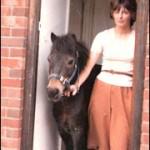How To Look After An Older Horse
The record for the oldest pony is 56. Sugar Puff, a 10hh Shetland-Exmoor gelding â owned by Sally Botting. Sugar Puff died in May 2007 following complicated problems with his health.
As a nation, we love our horses and as a result of this, the population of older horses and ponies is constantly growing. With the rising amount of horse sanctuaries becoming apparent (which are aimed at older horses and ponies), this means our four legged friends are living longer. This is in stark contrast to the past where once a horseâs uses were finished and could only be pets rather than working animals, they were shot and fed to the hounds or sold as meat.
This occurred in the war. At the end, most of the surviving horses were sold on as horse meat to Belgian butchers, being dismissed as unfit for any other purpose. This couldnât be further from where we are today.
So, how do you know how old your horse is?
For young horses, one year is equal to about 3.5 years of a humanâs life. So, a 10-year-old horse is equivalent to a 35-year-old human. The ratio changes slightly as horses get older, when one year is equal to about 3 human years: so a 20-year-old horse is equal to a 60-year-old human.
The things to look out for when your horse is beginning to age are:
– A sway/dipped back
– A drooping lower lip
– Deepening grooves around the eyes with grey hair
– Significant weight loss â slimmer horses can be more susceptible to parasite problems and disease. Also, once older horses begin to get thinner, it can be impossible for them to reach their correct body condition as before.
– Lameness due to arthritis
One common occurrence in our older friends is arthritis in at least one joint. It can be seen as stiffness or lameness but can be helped by exercise. However, animals with arthritis can get worse in the cold weather. If you imagine it like when the weather is cold, your hands tend to freeze up because the joints get stiff. This is similar to a horse except for a horse it can be worse. Arthritis is usually the most common reason for a horse to retire.
Low doses of Bute medication can be used for arthritic horses however, a side affect can be liver damage in the long term. Another thing that has to be considered with medicating your horse is that if he/she needs a high dose to keep them comfortable, you have to think about the welfare of the horse and that in regards to keeping them alive.
Other more natural tonics are cider vinegar (a daily ounce) and copper bangles (attached to leather for safety reasons and around the hoof area).
Now, when it comes to feeding an older horse, this requires more due and attention. Research has recently shown that older horses canât digest protein, phosphorus and fibre as well as their younger equivalents. If you think that your older horse is doing ok then a change may not be necessary but, research shows that protein and phosphorus levels may still need to be increased. The main aim for an older horse to keep healthy in regards to feeding is a higher quality, more digestible feed. As well as this, ensuring that your older horse or pony is remaining on a good quality pasture throughout the warmer months can help their nutrition as long as their body is in correct condition.
However, you need to bear in mind when turning out your older horses and ponies that they could fear being hurt by other animals. To solve this you can either put him/her in a group where he/she is less likely to get bullied or you can feed them separately.
Horses tend to live better outside where they have the room to canter freely around. They have all the grass they could wish for and plenty of room to burn it all off again! Watch out for the signs of liver damage though such as: weight loss, excessive yawning, lethargy and lack of interest in hard food as well as total anorexia and neurological signs i.e. head pressing.
Like us, as horses get older, they require even more TLC and attention. They can be moody like us because their bodies arenât quote how they used to be but if you keep an eye on them and look after them; they will flourish into their retirement years.


